Artificial Intelligence
Job Displacement and Reskilling of the Workforce:
AI is changing the job market fast, and many roles are at risk of disappearing. Learn why workforce reskilling is now essential to stay ahead and secure your future.
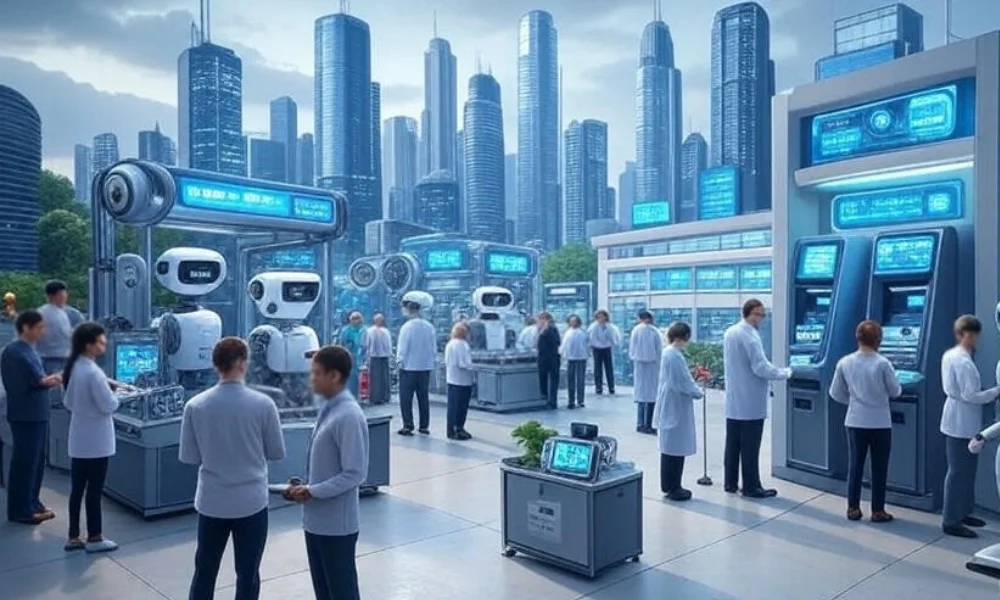
Artificial intelligence is transforming everything surrounding us, including the way we shop to the way we work and make money. Day after day, I witness companies moving towards automation tools that outperform humans quickly, at low costs, and with high levels of accuracy. That sounds exciting, however, it also gives people like me grave concerns as to what this will entail with regards to our future.
Definition:
AI job replacement is the loss of the job you currently possess, because it can now be more effectively and faster performed by a machine or program.
It is not only about robots on the factory floors but rather about digital tools that are replacing work at banks, hospitals, or even in classrooms. In my opinion, AI is excellent, and at the same time, it can drive individuals out of the job they have been doing years. This is why we need to discuss the workforce reskilling programmes before it is too late.
What is Job Displacement?
- I keep hearing about the threat of job displacement by AI, but what does that actually entail to workers in my position?
- In the past we have witnessed job loss with the industrial revolution and also when the internet burst into the work scene. What is different today is that machines can think, respond, and even learn automatically as opposed to the changes experienced in the past.
- Some of the technologies driving this change comprises robotics, machine learning, and natural language processing tools such as chatbots. I have witnessed customer service by computerized programs in businesses and factory robots that never sleep or take a day off. And when I consider the rate at which it is occurring, it seems like there is not one industry that is entirely secure anymore.
- Certain industries are evidently more susceptible than others depending on their daily labor activities. Smart systems and self-checkout technology also pose a threat to retail workers such as cashiers and other administrative positions.
What happens to the Human Being when they lose their Job?
- When I consider job loss, I do not only consider income, I consider the impact on the lives of people and their confidence. When you lose a job that you have worked at for years, you feel lost, stressed and you do not know what to expect. I have watched friends do this, and, frankly, emotionally it can be every bit as tough as the financial.
- Fear of many is how they will pay rent or maintain health insurance in case their job is eliminated because of automation. I personally have experienced that concern, of whether the skills I possess at the present will be sufficient to keep me jobless in the future. It is more than simply getting a new job, it is about getting some stability in the world that is changing too quickly.
- Not all people are equal when it comes to losing their jobs to AI, and I believe it should be discussed openly. First to experience the heat of automation are usually people who do not have college degrees or those in physical employments. Minorities, older employees, and rural populations are also more likely to have obstacles to returning to work or acquiring new skills.
- Consequence of these skewed effects leaves me with no doubt on the importance of having more powerful and equitable workforce reskilling initiatives that are inclusive. Failure to plan will see us leaving millions of people behind with only a few enjoying the fruits of new technology. It is a future I do not want to experience come true- and it is one of the reasons this issue is so important to me and others.
Reasons Reskilling is the solution in 2020:
- First time I heard about workforce reskilling programs, I had no idea what to think and how it would benefit me. Now I know that reskilling is about learning a new thing so that I can transition into an occupation that cannot be taken over by machines. And it’s not a buzzword it is something that is already transforming lives, mine included, and the lives of people in my community.
- AI is not stealing jobs, it is creating ones that did not even exist five years ago in both the technical and service sectors. New jobs such as data analysts, cybersecurity, and AI ethics officers are scarce and require human thoughts. Reskilling enables me to keep up with the current demands of employers in case I wish to remain employed in this new economy.
- And the distinction between reskilling and upskilling is also quite big, which I had to figure out personally. Reskilling is more like changing career completely and upskilling is expanding in the job you are in with improved tools.
- More I read, the more certain I am that I am not helplessly facing the replacement of my job with AI. Reskilling provides me with choices, and I am certain that I do not have to wait to be phased out–I can begin training now. By having the proper tools and education we can future proof our careers and regain control of our professional lives once again.
Why Reskilling Is So Difficult to Most Individuals?
- I believed that I could easily enroll in a workforce reskilling program, and I was proven wrong as there are tangible obstacles. If you are like most of us, classes, travel, and materials cost quickly accumulate and cause an enormous strain on our budget.
- And when training is accessible, fiting it in when you already balance work and family seems impossible. I have heard of parents who would like to acquire new skills but cannot get child care or flexible working hours that suit them. Another problem is motivation: when you worry about money or failure, it is difficult to remain concentrated on the process of learning something new.
- Other major issue is whether the training will really result into a well paying job with long term prospects. I have witnessed individuals go through programs only to find out that the skills they acquired cannot really get them a job in their local market. Programs should be based on the requirements of the real job, otherwise they are a waste of time and money that people cannot afford to spend.
- Employers and government also play a role here and I would like them to be more serious about it sometime. Number of companies providing in-house reskilling opportunities is too low, and the public programs tend to fail to target those in need the most. We need more planning, funding and coordination of these opportunities so that individuals like myself can be able to utilize them.
Question of Who Should Pay to Reskill?
- A question I frequently ask myself is, who should take the initiative where it concerns equipping workers like me with new skills within a short period? There is no easy way to answer it, but I suppose that it should be a shared responsibility of employers, the government, and even me. We all have our part to contribute in case we are to make workforce reskilling programs truly universally accessible and successful.
- Automation has the greatest advantage to employers and therefore, employers should invest in training programs to help in cushioning such workers. I saw that some tech-companies provide free bootcamps and certifications, and I believe that more companies should do the same. They are able to offer job specific training which ensures that individuals are able to move to jobs which are already existing in the same organization.
- There is also the huge role of the government, which is critical in financing the programs and accessing communities that businesses may bypass.
- I can not wait though, I must be responsible and do my own learning and growing as well. It involves studying programs, having hopes and making time in my already hectic life to pursue a better future. I know I have to do it, though it is hard work to keep ahead of the job displacement by AI.
What Happens If We Don t Act?
- I recently wonder what our future would become should we keep on dismissing the problem of job displacement due to AI and automation. Otherwise, the Increasing unemployment may strike us very soon and deprive millions of individuals like me of decent employment. Such mass unemployment may cause a spiral of effects that will damage families, communities, and whole local economies.
- Unemployment is not a solely economic problem, it may cause a significant social turmoil when individuals become neglected or left out. I have witnessed frustration becoming intense as individuals lose hope and see no one concerned about their fears and helping them recover. Otherwise, communities will see a rise in crime, inequality and political division propagated by fear and uncertainty.
- With a huge chunk of the labour force lacking preparedness, companies can not find talents and that hamper national development.
That, to my mind, is a future we can and must prevent with proper planning and substantial investment in reskilling.
What Are the Prospects in the Future?
- It is human to look at what we stand to lose but I also like to consider what we may get out of change. AI is already creating new industries, such as clean energy, biotech, and digital education, and those industries require talent. Through proper guidance, we would have an opportunity to build a more inclusive, equitable, and diverse workforce than ever.
Developing a Growth Mindset:
- Recently, I’ve noticed that my perspective on AI and job change matters a lot when it comes to my coping with it. I used to be afraid of machines but I have since changed my mind and now I look at machines as friends that assist us to work smarter and find solutions to the big challenges. With growth mindset, I will be able to concentrate on what I can learn instead of what I will lose next.
- AI is here to stay and frankly, it already is altering the way we live and work in manners that I could never have foreseen. However, by learning to adapt, I would not be replaced, but rather improve together with the technology and remain market competitive. That, to me, is the true strength of reskilling: not only surviving, but thriving, being confident and having a better future, all of us included.
Conclusion:
This writing made me realize how soon the problem of job displacement by AI may become relevant to me and how important the process of reskilling the workforce has already become. This transition is not a problem of the future and it is not just an issue that is occurring now; it is a change that is being experienced day in and day out by people like myself. However, I also think that we cannot do nothing, and proper instruments will help us to create a better future for all people.
I have told you about the importance of reskilling, who needs to be accountable, and what the consequences of the lack of action could be.
I really am convinced that by taking this challenge collectively we will be able to create a strong, skilled and future ready workforce. This is the time to begin learning, to remain curious, and to decide to grow instead of giving in to fear, as our future is on the line. What say ye? Have you or anybody you know been a victim of automation? What are you being taught to develop the future? What do you think about it? I would love to know, so leave a comment and share this with someone you think needs it!
-
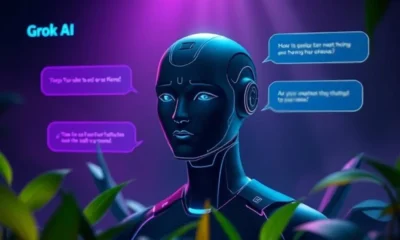
 Artificial Intelligence8 months ago
Artificial Intelligence8 months agoHow to Use Grok AI: A Complete Guide
-

 Artificial Intelligence10 months ago
Artificial Intelligence10 months agoWhat is Artificial Intelligence? A Comprehensive Guide for Businesses and Enthusiasts
-
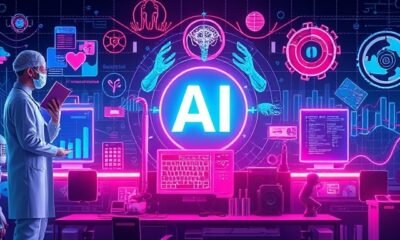
 Artificial Intelligence9 months ago
Artificial Intelligence9 months agoUnlocking the Power of Artificial Intelligence Tools
-
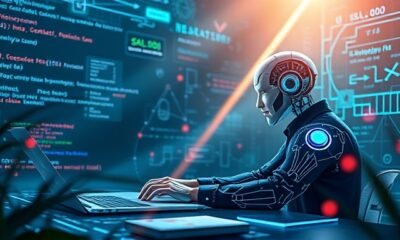
 Artificial Intelligence9 months ago
Artificial Intelligence9 months agoWhat is DeepSeek? Revolutionizing AI with Cutting-Edge Solutions
-
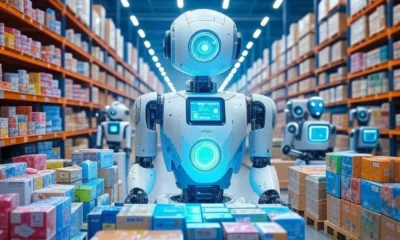
 Artificial Intelligence5 months ago
Artificial Intelligence5 months agoAI Technologies in Warehouse Automation:
-
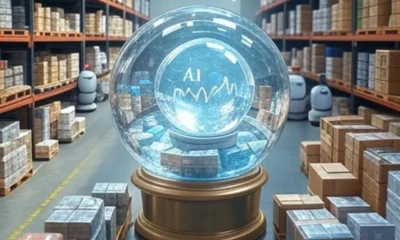
 Artificial Intelligence5 months ago
Artificial Intelligence5 months agoPredictive Analytics for Demand Forecasting:
-

 Artificial Intelligence6 months ago
Artificial Intelligence6 months agoMeta’s AI Push: The Standalone Assistant App Set to Rival ChatGPT
-

 Artificial Intelligence5 months ago
Artificial Intelligence5 months agoHow Artificial Intelligence is Revolutionizing Logistics:


